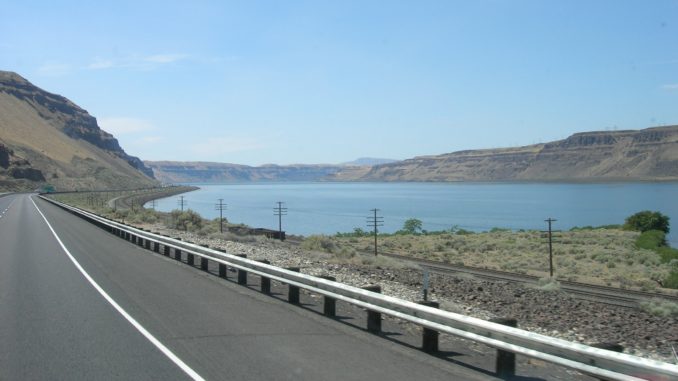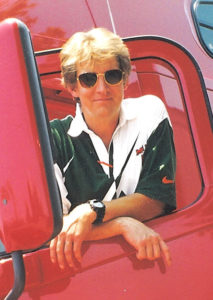
What was your career path? What do you like about truck driving as a job?
As a child, I was crazy about big trucks. Whenever I saw one, I’d stop whatever I was doing and stare in awestruck wonder. To some extent, I still feel the same. Big Trucks are cool.
I got into trucking at age 42. I had solid experience in education, restaurants, and as a writer. I’d recently turned down good jobs in those fields. Also, I’d been a full- or part-time college student for almost 20 years. I wasn’t the usual applicant for over-the-road (OTR) trucking. I didn’t really need the work.
At the time, however, I was living in somebody’s basement. I had two minimum-wage, part-time jobs (in a school and a restaurant). I was disillusioned, bored, and looking for a change. A friend had recently got into trucking. He was making good money. “All the trucking companies are hiring,” he told me. “Call them.”
So, I called a trucking company, got hired, completed trucker training, got my CDL, and started driving. I loved it: life on the road driving big trucks, seeing the country, the constant change of scenery, and the money. I went out OTR and didn’t come back for three months.
What does it mean to be successful in this job?
If you’re a successful truck driver, it means when you’re given freight to deliver, you deliver it safely, legally, and on time.

Being successful means that, before getting behind the wheel, you make sure your rig is in good mechanical condition, and you’ve learned a safe, legal route to your next stop.
As a successful truck driver, you check the weather, traffic, and road conditions where you are and where you’re headed, and you plan your trips accordingly.
You know where your next stop is, what time you’ll arrive, and what you’re likely to encounter. When you’ll be driving overnight—it happens, occasionally—you’ve prepared for it.
If you’re a successful truck driver, it means you’ll be on your own, so you’re ready to handle unforeseen problems independently. You know difficulties will arise, and when they do, you have solutions.
Success means you know what to do. You have a first-aid kit and know basic first aid. You have at least a basic tool kit and essential spare parts, and you know how to use them. You have spare batteries (phone, flashlights, computers, and et cetera), clothing for any kind of weather, and a few days of extra food and water.
If you’re a successful truck driver, you’re prepared to take full responsibility for yourself, the truck, and the freight. You’re ready to make the pick-up or the delivery thousands of miles away, come hell or high water, safely, legally, and on time.
How do you get the mileage and the money that work for you?
In the trucking industry, mileage equals money. The more you drive, the more you earn. As a rookie driving solo, you’ll likely earn 30-35 cents/mile. Teams generally make more. You’ll likely average 2,500-3,000 miles weekly, give or take. You can do that math. Some companies pay more than others, so it’s worth looking around a little bit.
As with any job, if you‘re new and inexperienced, your options are limited. You’ll easily find work, but you’ll have to take the work you’re offered. Do it as best you can. Accept your assignments, deliver the freight (safely, legally, on time), and then ask for more.
Keep out of trouble: no tickets, accidents, getting lost, abusing and damaging your rig, arguing with customers, and et cetera. Don’t cause your employer any problems. It pays to have a good relationship with your driver manager (DM); if you make your DM happy, he/she will make you happy. You’re paid to drive the truck, so when you’re assigned a load, don’t complain. Just do the work as best you can.
Be patient. The work is hard. Do it well—on-time, no problems, good attitude—and the money will come. After about two years, more job options open up. Most trucking companies will hire you. You’ll hear about good opportunities: more pay for the same or less/easier work. If you do your job well and stay on the lookout for better jobs, you can be making about $50,000 a year within a few of years of starting out.
How do you balance that with the home time you want?
In my opinion, a lot of misinformation is spread around about the home time issue.
As an OTR trucker, you’ll spend a lot of time away from home. Perhaps more accurately, the truck and the highway are your “home.” Truck drivers seem to not want to hear that. Nonetheless, an OTR trucker lives mostly on the road. That’s the job and the lifestyle, whether anyone likes it or not.
That viewpoint worked best for me. I chose OTR driving as my job and my lifestyle. Spending time away from home meant doing my job well and earning more money. It made everything easier for me if I thought about being “home,” in my house, as little as possible.
It created problems in my relationships. I was single and childless, but I had girlfriends. They didn’t like my being gone, and I didn’t like leaving them, but I was an OTR driver. A day at home was a day I wasn’t doing my job or earning money. That’s how I saw it.
Trucking companies promise their OTR drivers home time, usually about four days a month, give or take. However, big trucks are expensive. Companies buy them to haul freight. A parked rig loses money, so the company wants you in that rig hauling freight, all of its promises of home time notwithstanding.
Rightly so: driving the truck is your job. Like any traveling job, it might create problems for your spouse, children, and other obligations. You’ll be gone a lot. Your home time is limited.
Here’s my advice. Try it. See what happens. If problems arise, take step back and assess the situation. Talk with others involved; their thoughts and feelings matter. Weigh all the factors. If it’s obvious that driving OTR is causing too many problems and it’s simply not compatible with your life, try driving locally. It pays a little less, but you’re home every night.
Trucking is reliable work and income. Also, the first year or two are the toughest. After that, better opportunities come. Also, with time both you and those you love can learn to live with the job and the lifestyle. So, give it a fair chance.
What advice would you give to a new, aspiring truck driver?
To me, driving OTR is one of the best jobs in the world, but it will change your life dramatically, so be ready for it.
In your old life and your old job, you slept nights and worked days. You ate at a table at least once a day. The bathroom and kitchen were nearby. People and surroundings were familiar. You lived in a house or an apartment and worked in a big building. Each day you awakened, drove to work, and went home at the same time. You saw family and friends, watched television, and slept in a big bed. You did this every day, except on weekends and holidays.
When you get into OTR driving, all of that will change because it’s not just a job. It’s a lifestyle that’s different from what you’ve known. Any new job changes your life. In OTR trucking, the changes are much greater. If you and others in your life can adjust, it’ll be easier. However, according to industry statistics, many new drivers last only about a year.
That’s the truth, but OTR trucking can be great. It was for me. I found the changes and challenges more than worthwhile. Here are three reasons why.
First, it’s good-paying work in an industry that’s always hiring. Most people compete for jobs. As an OTR driver, you’ll have trucking companies competing to hire you. You work hard for that freedom, but to me, that alone makes OTR trucking a great line of work.
Second, the work is fun. You get to drive big trucks, and they’re nothing but cool. You’re surrounded by windows and have a great view of ever-changing scenery.
Third, you’re in charge. Your employer knows where you are and what you’re doing, but if you’re a solo driver, nobody else is with you. You’ll learn to live on the road, handle problems, and face nature and the elements independently, up front, and one-on-one. You won’t have to create adventure. You’ll live it, every day.
You’ll see people going to work at the same place, probably at a desk, looking at the same four walls. You’ll be headed out over the road to see the country and learn things that few others learn. It’s a great feeling, like no other. Every day is an adventure, and you get paid for it.
To me, OTR trucking is among the best jobs in the world.
